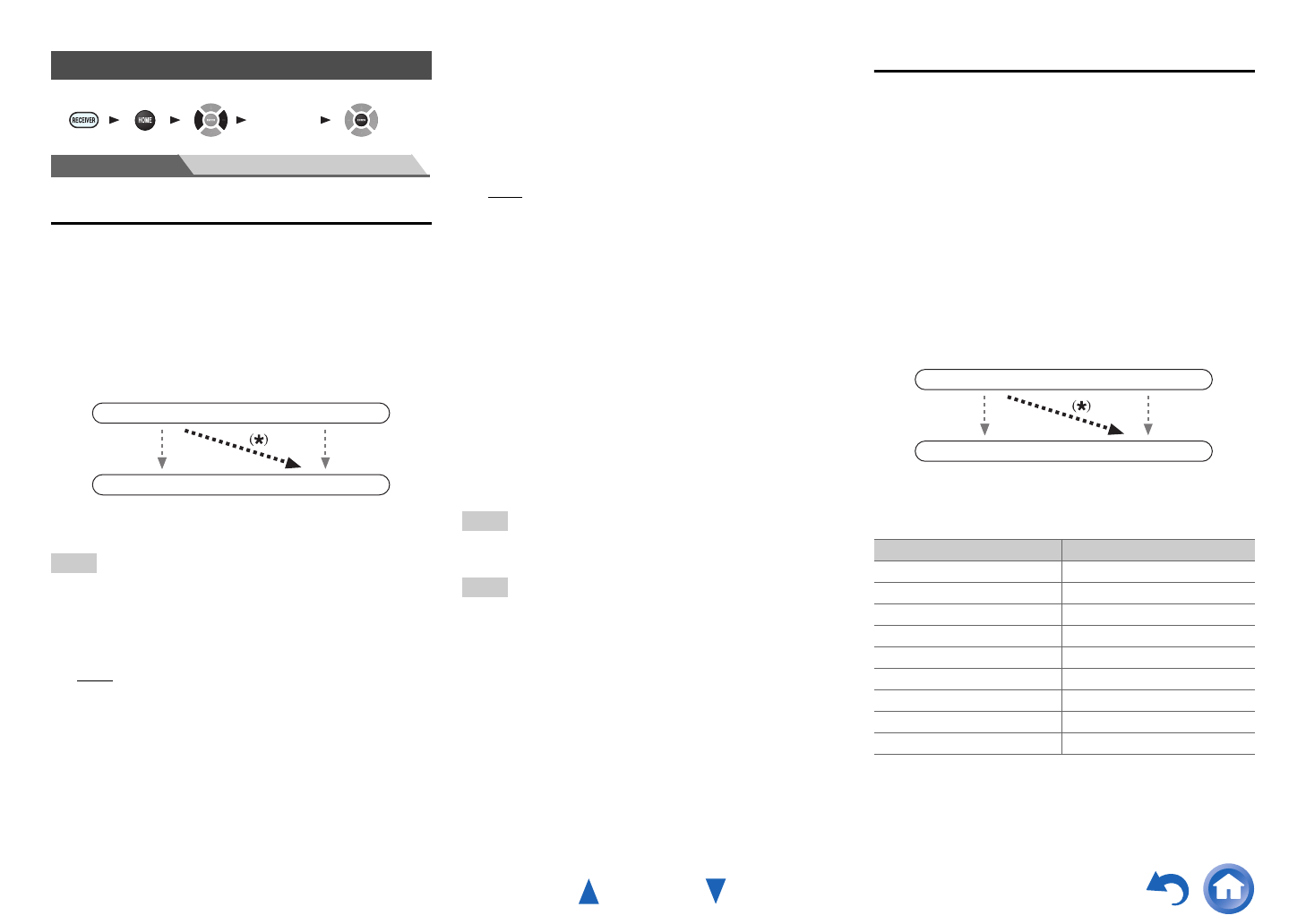
Advanced Operations
En-50
Main Menu Input/Output Assign
Monitor Out
On the “Monitor Out” settings, you can select whether or
not to have the video sources’ images output through the
HDMI output.
If you connect your TV to HDMI output, “Monitor Out”
setting is automatically set and composite video and
component video sources are upconverted
*
and output.
Note
• See “Video Connection Formats” (➔ page 87) for charts
showing how the “Monitor Out” and “Resolution” settings
affect the video signal flow through the AV receiver.
■ Monitor Out
`Main
:
Select this if your TV is connected to HDMI OUT
MAIN.
`Sub:
Select this if your TV is connected to HDMI OUT
SUB.
`Both:
Select this if your TVs are connected to HDMI OUT
MAIN and HDMI OUT SUB. Video signals are
output from both HDMI outputs at the resolution
supported by both TVs.
■ Resolution
`Through:
Select this to pass video through the AV receiver at
the same resolution and with no conversion.
`Auto
:
Select this to have the AV receiver automatically
convert video at resolutions supported by your TV.
`480p, 720p, 1080i, 1080p:
Select the desired output resolution.
`1080p/24:
Select this for 1080p output at 24 frames per second.
`4K Upscaling:
Select this for an output resolution four times that of
1080p. Depending on the resolution supported by
your TV, it will result in either 3840 × 2160 or 4096
× 2160 pixels.
You can specify the output resolution for HDMI OUT
MAIN and have the AV receiver upconvert the picture
resolution as necessary to match the resolution supported
by your TV.
Tip
• You can see the picture by pressing ENTER to check the
“Resolution” setting (excluding NET input source).
Note
• Depending on the incoming video signal, the video playback may
not be smooth or the vertical resolution may be lowered. In this
case select anything other than “1080p/24”.
• With some TVs, there may be no picture when this setting is set
to “4K Upscaling”.
• If the “Monitor Out” setting is set to “Sub”, this setting is fixed
to “Through”.
• If the “Monitor Out” setting is set to “Both”, this setting is fixed
to “Auto”.
HDMI Input
If you connect a video component to an HDMI input, you
must assign that input to an input selector. For example, if
you connect your Blu-ray Disc/DVD player to HDMI IN 2,
you must assign “HDMI2” to the “BD/DVD” input
selector.
If you’ve connected your TV to the AV receiver with an
HDMI cable, composite video and component video
sources can be upconverted
*
and output by the HDMI
output. You can set this for each input selector by selecting
the “-----” option. See “Video Connection Formats” for
more information on video signal flow and upconversion
(➔ page 87).
Here are the default assignments.
Input/Output Assign
1 2 3 4 5
“Setup”
IN
OUT
Composite video,
component video
HDMI
HDMI
Composite video,
component video
Input selector Default assignment
BD/DVD HDMI1
CBL/SAT HDMI2
STB/DVR HDMI3
GAME HDMI4
PC HDMI5
AUX FRONT (Fixed)
TV/CD -----
EXTRA1 -----
EXTRA2 -----
IN
OUT
Composite video,
component video
HDMI
HDMI
Composite video,
component video


















